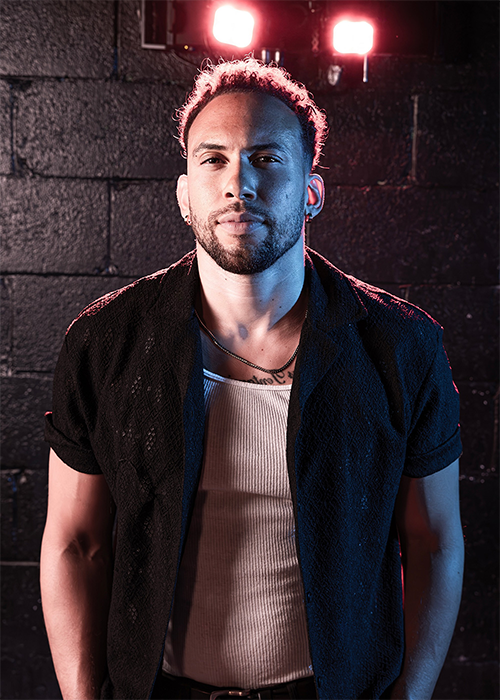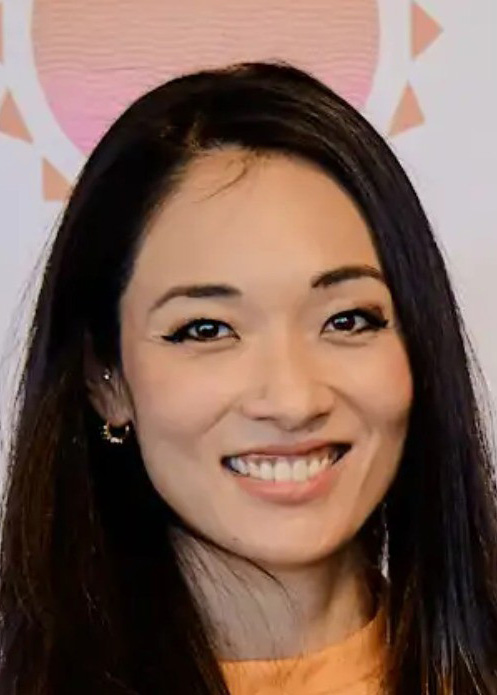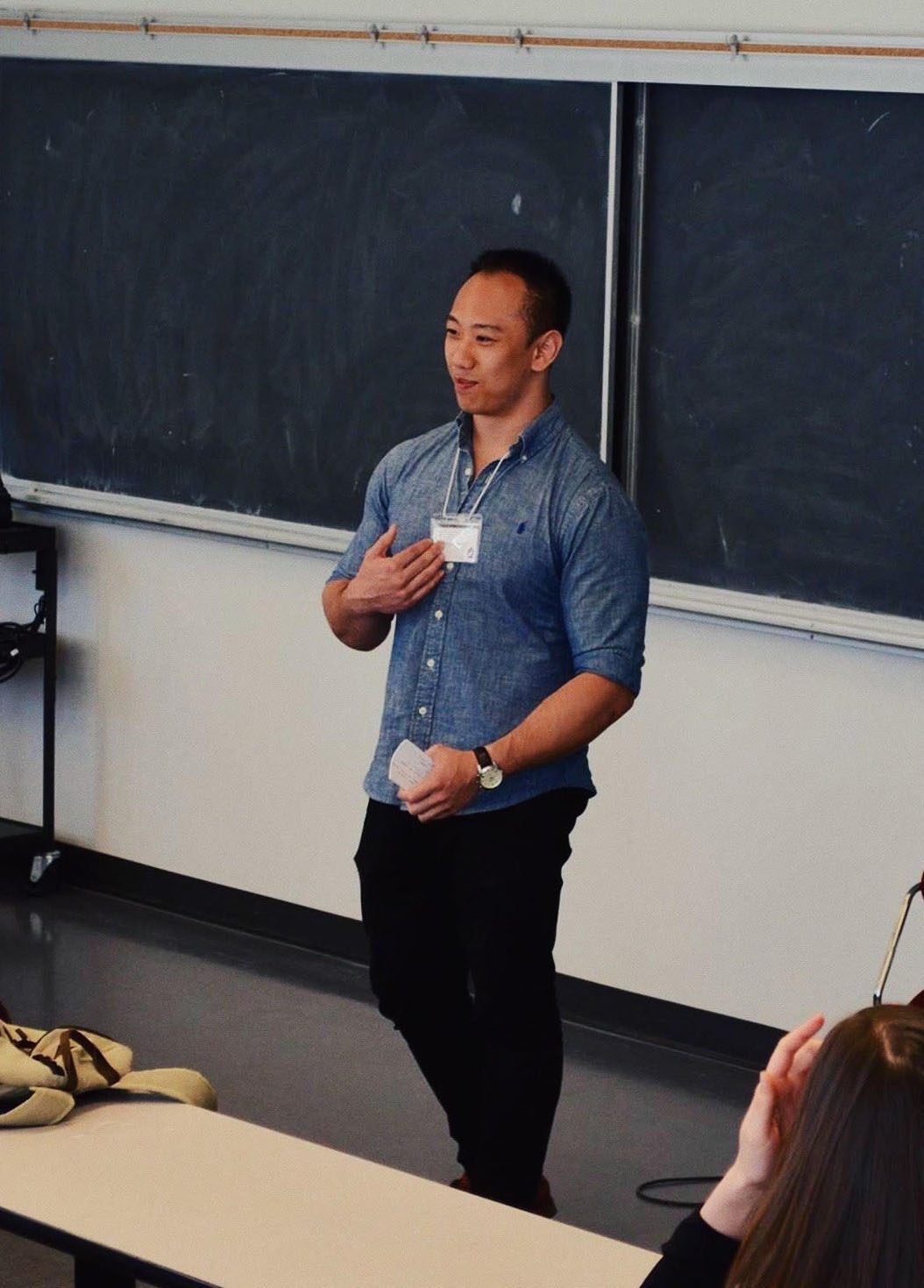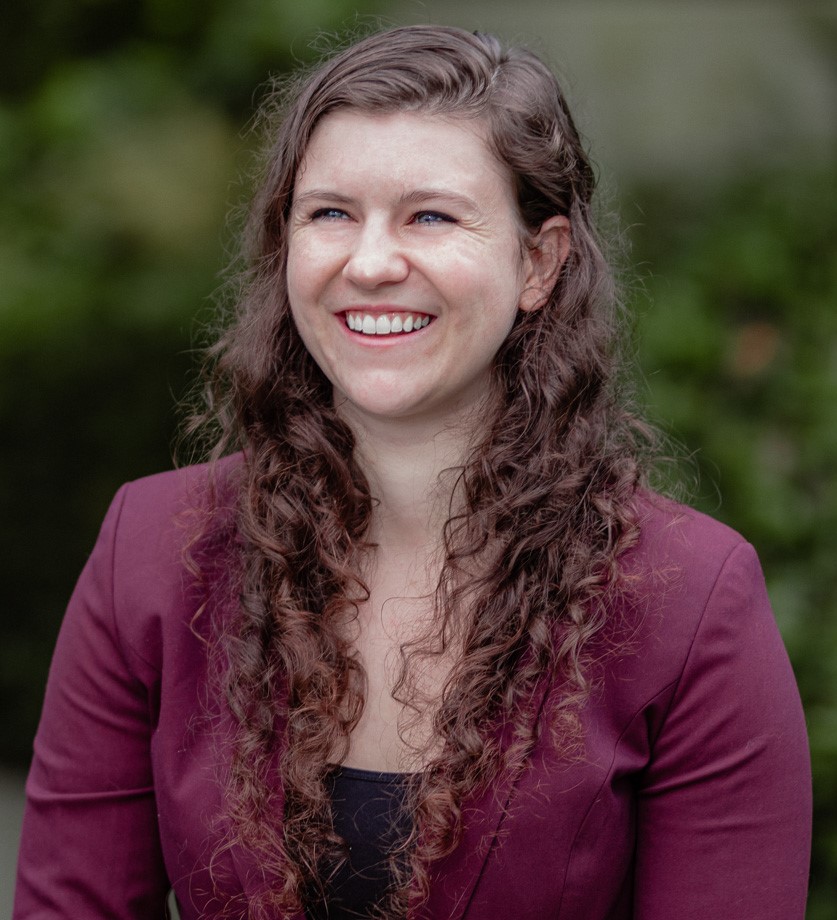Marion Benkaiouche
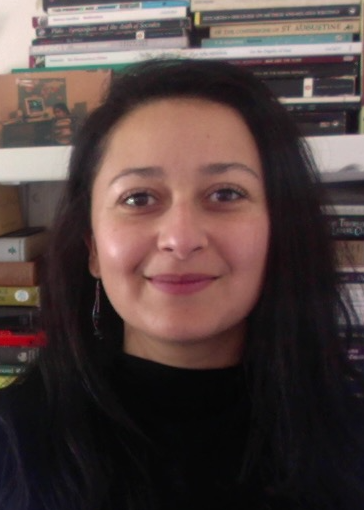
Why did you choose your program at UBC and what did you enjoy most about it?
I originally wanted to study marketing because I loved watching TV commercials as a kid, but my (very French) father told me to study something practical like political science. Being from a very international and displaced family, I watched the news daily from a young age and travelled from France to Canada and then to the States, so I frequently had to assimilate to different cultural contexts. I had always wanted to be a diplomat, and it seemed like a no-brainer to choose UBC’s Political Science program (my sister had completed this program as well).
I especially enjoyed my coursework in political theory with Dr. Samuel LaSelva, the courses taught by Dr. Paul Kopas on cities and municipal government, and my experiential learning coursework with Dr. Antje Ellermann. As part of Dr. Ellermann’s course on immigration policy, I volunteered with Immigration Services Society of BC. Additionally, I got to visit a nuclear submarine with Dr. Allan Craigie’s class on the Canadian military. Lastly, I relished debating with my classmates once I was able to take fourth-year political science seminars.
What were some of your most meaningful experiences at UBC?
Strangely, the intense loneliness of being a commuter student and not having a built-in friend group available to me. UBC’s Vancouver campus allows for a lot of contemplative wandering and perambulation. Without these moments of reflection, I wouldn’t have had the ability to really think about the type of career journey I wanted to pursue (and how to shape my student life).
What choices did you make at UBC that contributed to your career success / journey?
Because I didn’t receive scholarship funding, I had to work throughout my time at UBC. I participated in three different Work Learn Program opportunities over the course of my degree. These roles paid very well and allowed me to cover my rent and tuition as well as build out my resume.
I worked at the Sauder School of Business first as a faculty A/V assistant and then as a help desk support analyst. In parallel, I spent several years as a French narrator with Access and Diversity. I recorded French audiobooks for a UBC French professor who could not utilize written media. Her syllabus explored colonial and post-colonial processes across the Francophonie and through this I learned more about my own family’s background as North African Berbers and how we ended up where we did.
These roles taught me to expand my horizon of possibilities. I wouldn’t have chased a career in tech without having worked at Sauder. Also, narrating helped me stay in touch with my mother tongue and reflect on the means through which we can make various spaces, especially professional ones, accessible.
I also volunteered for the Terry Project Podcast where I made wonderful friends with whom I’m still in touch today. I further created a Student Directed Seminar (ASTU400C with Dr. Allan Craigie) and I was a mentor through UBC’s Tri-Mentoring Program and another ASTU (Arts Studies) course. I actually did a lot of other things, but basically UBC offered many options and I tried to explore everything.
In my second year, I briefly decided to major in computer science. This attempt negatively impacted my GPA, and, in combination with some family troubles, made me reconsider where my strengths lay. This was a pivotal year because I learned that I love philosophy (for example, truth tables and predicate logic) but can’t handle hardware. So, I went back to political science and took every course in political theory that I could. This decision has served me well across roles I have held. The ability to try new things and think rigorously / divergently are important skills when scoping out projects and contracts.
What was your first job after graduation and what other jobs did you have before your current position?
I was a support analyst at a small marketing firm that no longer exists, where I had to learn SQL for the interview. I monitored data exchanges and resolved errors, which led me to create tickets for bugs and features for the software development team. I started in this role part-time during my final year at UBC (working full days around my class schedule on Mondays and Fridays) and transitioned to full-time once classes had ended.
A year later, I joined Arc’teryx Equipment. I was a support analyst once more but with a pay increase and the opportunity to be part of a much more dynamic environment from technological and organizational perspectives. After a year in the support analyst role, I was promoted to business analyst and then I became a business analyst manager. After a year in management, I took a sabbatical to start my first think-tank / research group as its director of development. About seven months later, I started simultaneously freelancing as a consultant with Arc’teryx, and I was later promoted to program manager there. After a few months, I knew it wasn’t the right place for me anymore. I really wanted to do research and be in an environment that would allow me to do so.
A close friend referred me to a role at KPMG, and that’s where I am today!
Is your current career path as you originally intended? What challenges did you face in launching your career?
I have always wanted to be a diplomat and also an anthropologist. From an Odyssey Planning perspective (an approach to long-term life and career planning), I have maintained a very specific direction where I have been able to do the work that I wanted to in the way I wanted to. I am very blessed that this has worked out, and very thankful. Business is all about diplomacy and stakeholder management, and an anthropologist’s outlook is crucial to understanding client and organizational needs.
The main challenge I continue to face is my own impatience. I’ve learned to be patient once I have set a general direction and created a loose plan. I typically look forward to results too much and this can make it difficult for me to focus on the tasks at hand (on which the results depend).
Launching a career is deeply personal. I learned to make the most out of what I had, and not to wallow too long in comparisons.
What do you like about your current job and what do you find challenging? How does it relate to your degree?
I love my current role because it enables me to work on projects where my strengths will complement the engagement. Being able to work in an environment where a “deficit-model” of learning is absent has enabled me to stretch my own abilities and take on more formal mentorship roles along with pedagogically-oriented work.
Studying political science taught me rigour and analysis. This serves me well in the current community planning and policy research I do at KPMG. The deep understanding I gained of Canada’s political and legislative landscape has proved crucial in my first year at KPMG. I have explained the Constitution Acts and asymmetrical federalism more times than I could have predicted!
A major challenge at work is time and efficiency. Research is time-consuming but clients require deadlines and regular milestones. I have learned to become a better reader and to be more effective at identifying and sharing insights.
From your experience, what has been the value of having an Arts degree?
Rigour, creativity, and open-mindedness. I never approach a challenge without abductive reasoning. I learned to prioritize reading books for pleasure and intellectual study while working. An Arts degree set me up to see intellectual work as life-work and not just something you do while enrolled in school. You can do the same things while having a job! Nobody is stopping you. And, continuously learning and studying makes life more interesting.
What advice would you give to students and alumni interested in breaking into your industry?
If you are considering a career in consulting, copy the students at UBC’s Sauder School of Business! See what types of networking events are being held and attend them. If the events are typically for business students, ask the event organizers if you can attend.
The Big Four and MBB consulting firms all have internships, co-ops, and new graduate schemes. My Sauder School of Business classmates knew about these pathways and their post-grad careers were essentially predefined. I really wish more Arts students knew about these.
Secondly, focus on your strengths and what makes you different. Standing out can be scary because you have nobody to copy, but it can pay dividends.
What advice would you give your graduating self?
Go to graduation, don’t skip the ceremony. (I skipped my ceremony and picked my diploma up instead, crying happy tears on the way home. Don’t do that!)
Stay in touch with your Faculty of Arts! I’m very grateful to remain connected with the UBC community long after graduation, and to be able to mentor students as an Alumni-in-Residence for the Compass Student Engagement Hub. It’s one of the best parts of my life.
Marion Benkaiouche



Why did you choose your program at UBC and what did you enjoy most about it?
I originally wanted to study marketing because I loved watching TV commercials as a kid, but my (very French) father told me to study something practical like political science. Being from a very international and displaced family, I watched the news daily from a young age and travelled from France to Canada and then to the States, so I frequently had to assimilate to different cultural contexts. I had always wanted to be a diplomat, and it seemed like a no-brainer to choose UBC’s Political Science program (my sister had completed this program as well).
I especially enjoyed my coursework in political theory with Dr. Samuel LaSelva, the courses taught by Dr. Paul Kopas on cities and municipal government, and my experiential learning coursework with Dr. Antje Ellermann. As part of Dr. Ellermann’s course on immigration policy, I volunteered with Immigration Services Society of BC. Additionally, I got to visit a nuclear submarine with Dr. Allan Craigie’s class on the Canadian military. Lastly, I relished debating with my classmates once I was able to take fourth-year political science seminars.
What were some of your most meaningful experiences at UBC?
Strangely, the intense loneliness of being a commuter student and not having a built-in friend group available to me. UBC’s Vancouver campus allows for a lot of contemplative wandering and perambulation. Without these moments of reflection, I wouldn’t have had the ability to really think about the type of career journey I wanted to pursue (and how to shape my student life).
What choices did you make at UBC that contributed to your career success / journey?
Because I didn’t receive scholarship funding, I had to work throughout my time at UBC. I participated in three different Work Learn Program opportunities over the course of my degree. These roles paid very well and allowed me to cover my rent and tuition as well as build out my resume.
I worked at the Sauder School of Business first as a faculty A/V assistant and then as a help desk support analyst. In parallel, I spent several years as a French narrator with Access and Diversity. I recorded French audiobooks for a UBC French professor who could not utilize written media. Her syllabus explored colonial and post-colonial processes across the Francophonie and through this I learned more about my own family’s background as North African Berbers and how we ended up where we did.
These roles taught me to expand my horizon of possibilities. I wouldn’t have chased a career in tech without having worked at Sauder. Also, narrating helped me stay in touch with my mother tongue and reflect on the means through which we can make various spaces, especially professional ones, accessible.
I also volunteered for the Terry Project Podcast where I made wonderful friends with whom I’m still in touch today. I further created a Student Directed Seminar (ASTU400C with Dr. Allan Craigie) and I was a mentor through UBC’s Tri-Mentoring Program and another ASTU (Arts Studies) course. I actually did a lot of other things, but basically UBC offered many options and I tried to explore everything.
In my second year, I briefly decided to major in computer science. This attempt negatively impacted my GPA, and, in combination with some family troubles, made me reconsider where my strengths lay. This was a pivotal year because I learned that I love philosophy (for example, truth tables and predicate logic) but can’t handle hardware. So, I went back to political science and took every course in political theory that I could. This decision has served me well across roles I have held. The ability to try new things and think rigorously / divergently are important skills when scoping out projects and contracts.
What was your first job after graduation and what other jobs did you have before your current position?
I was a support analyst at a small marketing firm that no longer exists, where I had to learn SQL for the interview. I monitored data exchanges and resolved errors, which led me to create tickets for bugs and features for the software development team. I started in this role part-time during my final year at UBC (working full days around my class schedule on Mondays and Fridays) and transitioned to full-time once classes had ended.
A year later, I joined Arc’teryx Equipment. I was a support analyst once more but with a pay increase and the opportunity to be part of a much more dynamic environment from technological and organizational perspectives. After a year in the support analyst role, I was promoted to business analyst and then I became a business analyst manager. After a year in management, I took a sabbatical to start my first think-tank / research group as its director of development. About seven months later, I started simultaneously freelancing as a consultant with Arc’teryx, and I was later promoted to program manager there. After a few months, I knew it wasn’t the right place for me anymore. I really wanted to do research and be in an environment that would allow me to do so.
A close friend referred me to a role at KPMG, and that’s where I am today!
Is your current career path as you originally intended? What challenges did you face in launching your career?
I have always wanted to be a diplomat and also an anthropologist. From an Odyssey Planning perspective (an approach to long-term life and career planning), I have maintained a very specific direction where I have been able to do the work that I wanted to in the way I wanted to. I am very blessed that this has worked out, and very thankful. Business is all about diplomacy and stakeholder management, and an anthropologist’s outlook is crucial to understanding client and organizational needs.
The main challenge I continue to face is my own impatience. I’ve learned to be patient once I have set a general direction and created a loose plan. I typically look forward to results too much and this can make it difficult for me to focus on the tasks at hand (on which the results depend).
Launching a career is deeply personal. I learned to make the most out of what I had, and not to wallow too long in comparisons.
What do you like about your current job and what do you find challenging? How does it relate to your degree?
I love my current role because it enables me to work on projects where my strengths will complement the engagement. Being able to work in an environment where a “deficit-model” of learning is absent has enabled me to stretch my own abilities and take on more formal mentorship roles along with pedagogically-oriented work.
Studying political science taught me rigour and analysis. This serves me well in the current community planning and policy research I do at KPMG. The deep understanding I gained of Canada’s political and legislative landscape has proved crucial in my first year at KPMG. I have explained the Constitution Acts and asymmetrical federalism more times than I could have predicted!
A major challenge at work is time and efficiency. Research is time-consuming but clients require deadlines and regular milestones. I have learned to become a better reader and to be more effective at identifying and sharing insights.
From your experience, what has been the value of having an Arts degree?
Rigour, creativity, and open-mindedness. I never approach a challenge without abductive reasoning. I learned to prioritize reading books for pleasure and intellectual study while working. An Arts degree set me up to see intellectual work as life-work and not just something you do while enrolled in school. You can do the same things while having a job! Nobody is stopping you. And, continuously learning and studying makes life more interesting.
What advice would you give to students and alumni interested in breaking into your industry?
If you are considering a career in consulting, copy the students at UBC’s Sauder School of Business! See what types of networking events are being held and attend them. If the events are typically for business students, ask the event organizers if you can attend.
The Big Four and MBB consulting firms all have internships, co-ops, and new graduate schemes. My Sauder School of Business classmates knew about these pathways and their post-grad careers were essentially predefined. I really wish more Arts students knew about these.
Secondly, focus on your strengths and what makes you different. Standing out can be scary because you have nobody to copy, but it can pay dividends.
What advice would you give your graduating self?
Go to graduation, don’t skip the ceremony. (I skipped my ceremony and picked my diploma up instead, crying happy tears on the way home. Don’t do that!)
Stay in touch with your Faculty of Arts! I’m very grateful to remain connected with the UBC community long after graduation, and to be able to mentor students as an Alumni-in-Residence for the Compass Student Engagement Hub. It’s one of the best parts of my life.
